
-
Posted By Diabetes TeleCare
-
-
Comments 0
Known as the king of fruits, mango is one of the most famous and healthfully rich fruits, with a remarkable flavor, scent, and taste. Being the most cherished product of the late spring season, it is complicated to oppose, however, for wellbeing, and given the great sugar content, diabetics fear consuming it and stay away from it. This blog will provide you with insights on mango and diabetes, including its benefits, nutritional facts, glycemic index, and safe consumption tips for diabetics.
Benefits of Mango
- Rich in Vitamins: Mangoes are a great supply of vitamins A and C, which can be fundamental for immune features, vision, pores, and skin health.
- High in Antioxidants: They include strong antioxidants like quercetin, beta-carotene, and mangiferin, which help shield the frame from oxidative strain and aggravation.
- Fiber Content: Mangoes provide dietary fiber, which supports digestion and manages blood sugar stages by slowing the ingestion of sugars.
- Supports Heart Health: The potassium and magnesium in mangoes contribute to heart health by assisting with controlling blood pressure and preserving a wholesome heartbeat.
- Boosts Immunity: The excessive nutrition C content material in mangoes strengthens the immune system and assists the body with fighting off sicknesses.
- Improves Digestion: Mangoes include enzymes like amylases that separate carbohydrates into basic sugars, supporting absorption.
- Promotes Eye Health: Vitamin A in mangoes upholds superb vision and prevents nighttime visual blindness and dry eyes.
- Skin Health: Vitamin C and A in mangoes promote healthy skin, encouraging collagen formation and restoration.
- May Aid in Weight Management: The fiber in mangoes lets you feel completely longer, doubtlessly assisting in weight management.
- Anti-Inflammatory Properties: Mangiferin, observed in mangoes, has anti-inflammatory effects, which can be useful in coping with diabetes-related headaches.
Nutritional Facts
Serving Per Meal
A typical serving size for mango is around 1 cup (150 grams) of sliced mango. Here are the nutritional facts for this serving size:
Calories: 99
Protein: 1.4 grams
Fat: 0.6 grams
Carbohydrates: 25 grams
Fiber: 2.6 grams
Sugar: 23 grams
Vitamin A: 25% of the Daily Value (DV)
Vitamin C: 76% of the DV
Folate: 18% of the DV
Vitamin B6: 11% of the DV
Potassium: 6% of the DV
Magnesium: 4% of the DV
Glycemic Index of Mango
The glycemic index (GI) measures how unexpectedly a meal raises glucose ranges after utilization. Food resources are evaluated on a scale from 0 to 100, with better qualities showing a quicker upward thrust in blood sugar ranges.
Glycemic Index of Mango: Mangoes have a glycemic index of around 51, which is regarded as slight. This implies that they motivate a mild expansion in blood sugar levels.
While the GI of mango is moderate, it is crucial to remember the glycemic load (GL), that is the carb content material of the serving length. The GL gives an extra precise image of what a selected meal size will imply for blood sugar degrees. Understanding the relationship between mango and diabetes can help diabetics enjoy this fruit without adversely affecting their health.
How to make mango more diabetes-friendly
Mango and Diabetes
The relationship between mango and diabetes revolves around careful consumption and understanding their effects on blood sugar. If you have diabetes and need to include mango in your eating regimen, you can utilize a few procedures to lessen the probability that it will raise your blood sugar levels.
Portion control
The most ideal way to limit this fruit’s blood sugar impact is to abstain from overeating at once.
Carbs from any food, including mango, may build your glucose levels — however, that doesn’t imply that you should exclude it from your eating routine.
A single serving of carbs from any food is around 15 grams. As 1/2 cup (82.5 grams) of cut mango gives around 12.5 grams of carbs, this piece is just under one serving of carbs.
If you have diabetes, start with 1/2 cup (82.5 grams) to see how your blood sugar answers. From that point, you can change your portion sizes and recurrence until you find the amount that suits you best.
Add a source of protein
Like fiber, protein can decrease blood sugar spikes when eaten with food varieties high in carbs, like mango.
Although mangos have relatively little protein, they do, in actuality, normally contain fiber.
In this manner, compared with eating the fruit without help from anyone else, consuming it with a protein source might cause your glucose to rise less.
Consider having your mango with a boiled egg, some cheddar, or a modest bunch of nuts for a more well-balanced meal or snack.
Is mango good for diabetes patients?
Yes, diabetic patients can eat mango; however, it’s critical to do so with some restraint. Here are some safe utilization and consumption tips for diabetics:
Moderation is key: Moderation is key when it comes to consuming mango and diabetes management. Limit your serving size to around 1/2 to 1 cup of cut mango (75 to 150 grams). This deals with carbohydrate intake and prevents a quick spike in glucose levels.
Pair with Protein or Fat: Combine mango with a source of protein or healthy fat, like nuts, yogurt, or cheddar. This can assist with easing back the retention of sugar and preventing glucose spikes.
Monitor Blood Sugar Levels: Keep track of your blood sugar levels before and after consuming mango to understand how it affects your body.
Choose Fresh over Processed: Consistently settle on new mangoes instead of canned or dried mangoes, which frequently contain added sugars.
Balance Your Diet: Guarantee that mangoes are important for a reasonable eating regimen that incorporates a lot of vegetables, lean proteins, entire grains, and solid fats.
Consider Piece Size: If you have mango as a part of a dinner, change your part to other carbs (like rice, bread, or pasta) to keep a balanced intake.
Stay Hydrated: Drink a lot of water over the day to assist with dealing with your glucose levels and remain hydrated.
Conclusion
Mangoes can be a magnificent and nutritious addition to a diabetic eating regimen when consumed in moderation. They offer various medical advantages, from supporting insusceptibility to advancing heart and skin health. By understanding the relationship between mango and diabetes, individuals can make informed decisions and enjoy this delicious fruit while maintaining their health. Always consult with your healthcare provider before making any significant changes to your diet.
For personalized care and deeper insights into managing diabetes, consider booking an appointment with our specialist. Your health deserves the best attention.
For Contact: +92 323 3004420
Recent News
- Are Carrots Good for Diabetes? Benefits and Glycemic Impact
- Bananas and Diabetes – Can Diabetics Eat Bananas? Find out here
- Managing Diabetes with Broccoli: Health Benefits and Tips
- How a Low Carb Diet Helps Diabetics Control Blood Sugar
- Is Sweet Potato Good for Diabetes? How They Affect Blood Sugar



